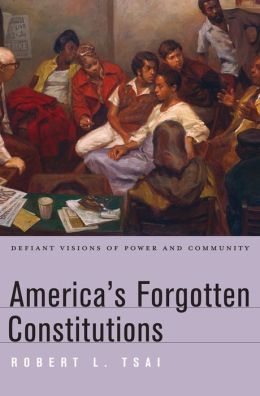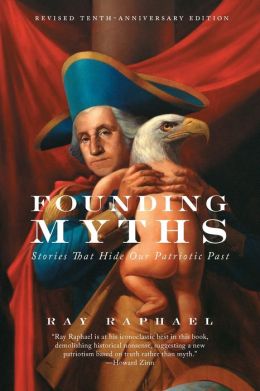 On this holiday weekend, there are plenty of reviews to read. Robert Tsai's America's Forgotten Constitutions: Defiant Visions of Power and Community (Harvard University Press) has been reviewed twice: here from The Daily Beast and here from Pop Matters.
On this holiday weekend, there are plenty of reviews to read. Robert Tsai's America's Forgotten Constitutions: Defiant Visions of Power and Community (Harvard University Press) has been reviewed twice: here from The Daily Beast and here from Pop Matters.Margaret Garb's Freedom's Ballot: African American Political Struggles in Chicago from Abolition to the Great Migration (University of Chicago Press) is reviewed in the Chicago Tribune.
 J. Douglas Smith's On Democracy's Doorstep: The Inside Story of How the Supreme Court Brought "One Person, One Vote" to the United States (Hill & Wang) is also popular this week. David Garrow reviews the book for The Washington Post, and Salon has an excerpt, "When SCOTUS still fixed things: What American looked like before the Warren Court."
J. Douglas Smith's On Democracy's Doorstep: The Inside Story of How the Supreme Court Brought "One Person, One Vote" to the United States (Hill & Wang) is also popular this week. David Garrow reviews the book for The Washington Post, and Salon has an excerpt, "When SCOTUS still fixed things: What American looked like before the Warren Court."In HistoryToday, two books on the politics of the Atlantic slave trade are reviewed: William Pettigrew's Freedom's Debt: The Royal African Company and the Politics of the Atlantic Slave Trade, 1672-1752 (University of North Carolina Press) and Brycchan Carey's From Peace to Freedom: Quaker Rhetoric and the Birth of American Slavery, 1657-1761 (Yale University Press).
Greg Lukianoff's Unlearning Liberty: Campus Censorship and the End of American Debate (Encounter Books) is reviewed on HNN.
The latest edition of Law and Politics Book Review is out with reviews of Alan Paterson's Final Judgement: The Last Law Lords and the Supreme Court (Hart) (here), Michael Boudreau's City of Order: Crime and Society in Halifax, 1918-35 (University of British Columbia Press) (here), and Gregg Frazer's The Religious Beliefs of America's Founding Fathers: Reason, Revelation and Revolution (University Press of Kansas) (here).
H-Net adds a review of Benjamin Ferencz: Nuremberg Prosecutor and Peace Advocate by Tom Hoffman (McFarland) and a review of Justice among Nations: A History of International Law by Stephen C. Neff (Harvard University Press).
The Washington Post reviews Price of Fame: The Honorable Clare Boothe Luce by Sylvia Jukes Morris (Random House).
"The hyperbole she inspired makes it impossible to distinguish her achievements from her personality and appearance. In 1943 such routine prejudice, which hounds powerful public women to this day, was exacerbated by her rarity: She was one of the few women in Congress, and the only one to show up on her first day wearing purple. Asked in later life whether she had felt disadvantaged in her career by being a woman, she seemed to duck the question: “I couldn’t possibly tell you. I have never been a man.” But the answer is more revealing than perhaps she knew: Because she was not a man, her words and actions were never separated from her appearance and emotions. For all else that brought her fame, from writing to politics to broadcasting, she was always judged as a woman first."
If you're looking for some Fourth of July themed readings, check out these reviews:
- In a piece titled, "If Only Thomas Jefferson Could Settle the Issue: A Period Is Questioned in the Declaration of Independence," The New York Times discusses Danielle Allen's Our Declaration: A Reading of the Declaration of Independence in Defense of Equality (Liveright).
- The Los Angeles Times reviews West of the Revolution: An Uncommon History of 1776 (WW Norton) by Claudio Saunt. "In "West of the Revolution: An Uncommon History of 1776," historian Claudio Saunt evokes this shadow saga of America's founding year in landscapes distinct from the 13 colonies. This is a history more terrible than wondrous, a necessary counternarrative to our enlightened Revolution."
- Also in the LA Times, Janet Napolitano reviews Liberty's Torch: The Great Adventure to Build the Statue of Liberty by Elizabeth Mitchell (Atlantic Monthly Press).
- The New Republic has a piece, "The Dangerous Lies We Tell About America's Founding," that reviews Ray Faphael's Founding Myths: Stories That Hide Our Patriotic Past (New Press) and Matthew Stewart's Nature's God: The Heretical Foundations of the American Republic (Norton).
- Washington Independent Review of Books has a review of Marc Leepson's What So Proudly We Hailed: Francis Scott Key, A Life (Palgrave Macmillan). "Key’s role in American history was greater than merely creating our national anthem. He was a lawyer who loved his work and worked on some major cases of the time, but he did not become interested in politics until Andrew Jackson ran for president. He was a family man who had a large brood. He was also a man of many contradictions, one of which was Key’s distaste for slavery while still owning slaves."
- Salon tells us "The Founding Fathers back Thomas Pitketty--and feared a powerful 1 percent."
- H-Net has a timely review of Remembering the Revolution: Memory, History, and Nation Making from Independence to the Civil War edited by Michael A. McDonnell, Clare Corbould, Frances M. Clarke, W. Fitzhugh Brundage (University of Massachusetts Press).


